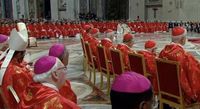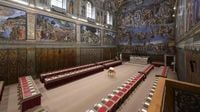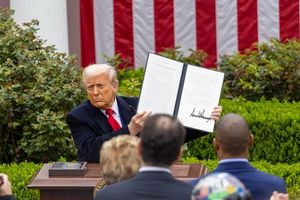As the papal conclave enters its second day on May 8, 2025, the atmosphere is thick with anticipation and uncertainty. Cardinal Péter Erdő, a prominent Hungarian figure and a potential candidate for the papacy, is among the 252 cardinals gathered in the Sistine Chapel, where the election process is unfolding in strict secrecy.
Cardinal Erdő, who has a long history of service within the Church, is not a stranger to the challenges of leadership. Born into a devout Catholic family in Hungary, he experienced the harsh realities of a communist regime, which forced his family to flee their home when he was just four years old. This formative experience instilled in him a deep faith and a commitment to guiding others toward salvation. After being ordained a priest in 1975, he dedicated his life to ecclesiastical service, earning degrees in theology and canon law from the Pontifical Lateran University in Rome in 1980.
Over the years, Erdő has held various significant roles, including teaching canon law and theology in Hungary and abroad, serving as rector of the Hungarian College in Rome, and eventually being consecrated bishop by Pope John Paul II in 2000. Three years later, he was appointed primate of Hungary and archbishop of Esztergom-Budapest, receiving the cardinalate in the same year.
His extensive academic contributions, with over 250 scientific publications and 25 volumes, have established him as a respected authority within the Church. In 2023, he was honored with the Vox Canonica Award, recognizing his excellence in canon law.
As the conclave commenced, Erdő expressed hope for a message of resurrection and eternal life to emerge from the discussions among the cardinals. In a video message released prior to the conclave, he noted, “The message of resurrection, carrying the hope of eternal life and addressed to all humanity, can be born as a result of the conclave.” He emphasized the importance of allowing the Holy Spirit to guide the process, recalling that Pope John Paul II once described a future papal election as a battle between evil spirits and the Holy Spirit, with the latter ultimately prevailing.
However, the conclave is not without its challenges. The first vote on May 7 resulted in black smoke, indicating no consensus had been reached among the electors. Cardinal Giovanni Battista Re, the 90-year-old dean of the College of Cardinals, delivered a homily during the Pro Eligendo Pontifice mass, urging unity among the cardinals as they seek to elect a leader who can navigate the Church through its current difficulties.
The atmosphere in the Sistine Chapel is charged with the weight of responsibility. The chosen Pope will carry the moral authority of 1.4 billion Catholics worldwide, a task that is both daunting and profound. Erdő, along with other candidates like Cardinal Pietro Parolin, Cardinal Luis Antonio Tagle, and Cardinal Matteo Zuppi, faces the challenge of uniting a divided Church.
In recent years, the Church has seen a decline in vocations, particularly among women religious, with numbers dropping from 699 in 2002 to just 303 in 2021. Erdő has been proactive in addressing this issue, emphasizing the need for a renewed focus on evangelization and youth pastoral care.
As the cardinals prepare for further voting rounds, the role of king makers—those influential figures who can sway votes—becomes crucial. Cardinal Parolin, as a former Secretary of State, is seen as a leading candidate, but his position complicates his ability to negotiate effectively. Other potential king makers include Cardinal Gerhard Müller and Cardinal Jean-Claude Hollerich, both of whom have significant influence within the conclave.
The conclave’s proceedings are closely monitored, with the public eagerly awaiting the first signs of a decision. The traditional smoke signals—black for no decision and white for a new pope—are a symbolic representation of the Church’s deliberations. The first smoke signal is expected around 7:30 PM on the evening of May 8, following two rounds of voting earlier in the day.
Throughout this process, Erdő has maintained a balanced approach to pressing issues such as immigration, recognizing the need for compassion while also advocating for the stability of host countries. His pastoral heart and commitment to the Church’s hierarchical vision resonate with many who seek a leader capable of bridging divides within the Church.
As the conclave unfolds, Erdő’s hope remains that the outcome will be a celebration of hope for a world in need. He believes that the Church must proclaim hope in a society that often feels devoid of it, particularly in the face of rising secularism. “It is in the light of the ultimate hope that our lives can become generous,” he asserted.
The next few days will be critical in determining the future direction of the Catholic Church. With each vote, the cardinals will not only be choosing a new pope but also setting a course for the Church in an increasingly complex and polarized world.
As the cardinals gather once more, the world watches with bated breath, hoping for a leader who can guide the Church through its trials and into a new era of faith and unity.





